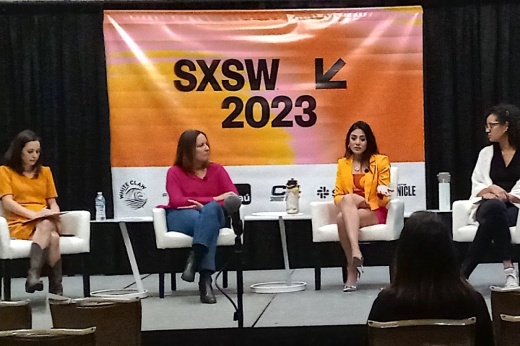Speakers who took part in a South by Southwest Conference & Festivals panel about food insecurity urged attendees to become more aware of hunger and how it is a symptom of bigger socioeconomic issues and public policy challenges.
In the March 13 panel at the Hilton Austin, Claire Campos-O'Neal, co-host of the podcast "Go Behind The Ballot," cited data from nonprofit Feeding Texas showing one in every eight Texans are food insecure, meaning they lack consistent access to affordable, healthy food.
Feeding Texas CEO Celia Cole said the COVID-19 pandemic, which sparked closures of businesses as well as job furloughs and losses, further exposed a decades-long problem of hunger in all types of communities.
“The pandemic was the first time this problem was even more visible,” Cole said.
Cole said such statistics do not really mean anything until one sees how people and communities are affected by challenges, such as hunger.
Other speakers said, however, it does not take a historic, wide-ranging event, such as a pandemic, to force people into a life of desperation.
One panelist, Lawson Picasso, a communications executive with the San Antonio office of engineering firm WSP, said a personal situation suddenly resulted in her being homeless at age 20. Picasso said she resorted to living in her car with her dog for six months while seeking out gainful employment and getting back on her feet.
Picasso recalled getting a waitressing job at a Hooters restaurant, a position that included a free gym membership, which she used to access hot showers and a chance to charge her phone.
Picasso said she could have taken advantage of forms of public assistance, but that would have meant taking time off from her job to file required paperwork to gain the public assistance.
According to Picasso, food insecurity tends to blend with other problems that affect unsheltered or low-income individuals, such as lack of regular access to job opportunities, transformation, stable housing, education or internet service—things that can help individuals improve their quality of life.
“The inaccessibility or lack of convenience for me was trying to get to the [public assistance] office just to fill out paper work. It didn’t fit my lifestyle, because if I did that, I’d miss work, and if I missed work, that was less money,” Picasso said.
Picasso said while she felt a sort of shame and stigma attached to challenges, such as hunger, she did her best to project a facade of calm and contentment in public during this rough patch in her life.
“It was an opportunity for me to put up a persona that everything was fine,” Picasso said. “I didn’t want to feel like a charity case.”
Cole agreed with how Picasso saw herself at the time.
“People feel that stigma and shame, and it can get in their way of getting help,” Cole said.
In that time, a friend informed Picasso about local resources, such as the San Antonio Food Bank. These and other services, Picasso said, allowed her to improve her situation and develop her career.
Picasso said she is now an advocate for solutions to social inequities.
“San Antonio is still dealing with [a past of redlining], and it has been a marginalized community,” Picasso said. “There are gaps in access to resources.”
Cole agreed with Picasso’s assessment that food insecurity not only reflects a lack of access to affordable, nutritious food in one’s community, it is a by-product of one’s personal financial struggles.
“Hunger isn’t so much a food problem as it is a money problem. If you get enough food for this month, there’s no guarantee you’ll have enough money for food next month,” Cole said.
Picasso and fellow panelists said public assistance programs, such as the Special Supplemental Nutrition Program for Women, Infants and Children and the Supplemental Nutrition Assistance Program can always be improved, but those systems need more input from users whose life experiences and challenges vary.
“I don’t think we were really listening to people who have had a lived experience that includes going hungry,” Cole said of public policymakers.
In September 2022, Picasso and Eric Cooper, San Antonio Food Bank president and CEO, traveled to Washington, D.C., and attended the White House Conference on Hunger, Nutrition and Health, the first event of its kind to happen in more than 50 years.
Picasso said she was honored to have been invited to share her personal experience, but admitted she and some fellow advocates at the event were disappointed by a lack of tangible objectives or follow-up offered by public policymakers.
“There are strategic goals, but without having the input of the people who actually need it, it really felt like the goals were a checked box,” Picasso said.
Panelist Nichole Abshire, co-host of "Go Behind the Ballot", said events such as the pandemic have spurred her to help find viable answers to challenges, such as food insecurity.
“This has been super important for me to look at my life and what is happening around me, and how to arrive at real-world solutions,” Abshire said.
Fellow panelists recommended attendees—and the public at large—get more involved in addressing hunger by volunteering with local food banks and similar community resources, and voting for election candidates and initiatives they believe can help to curb food insecurity.
“Wherever you can, keep being aware of what’s happening,” Abshire said.
Picasso said there are many ways people can help to fight hunger in America.
“Take the anger and put it into actions that are meaningful,” she said.





